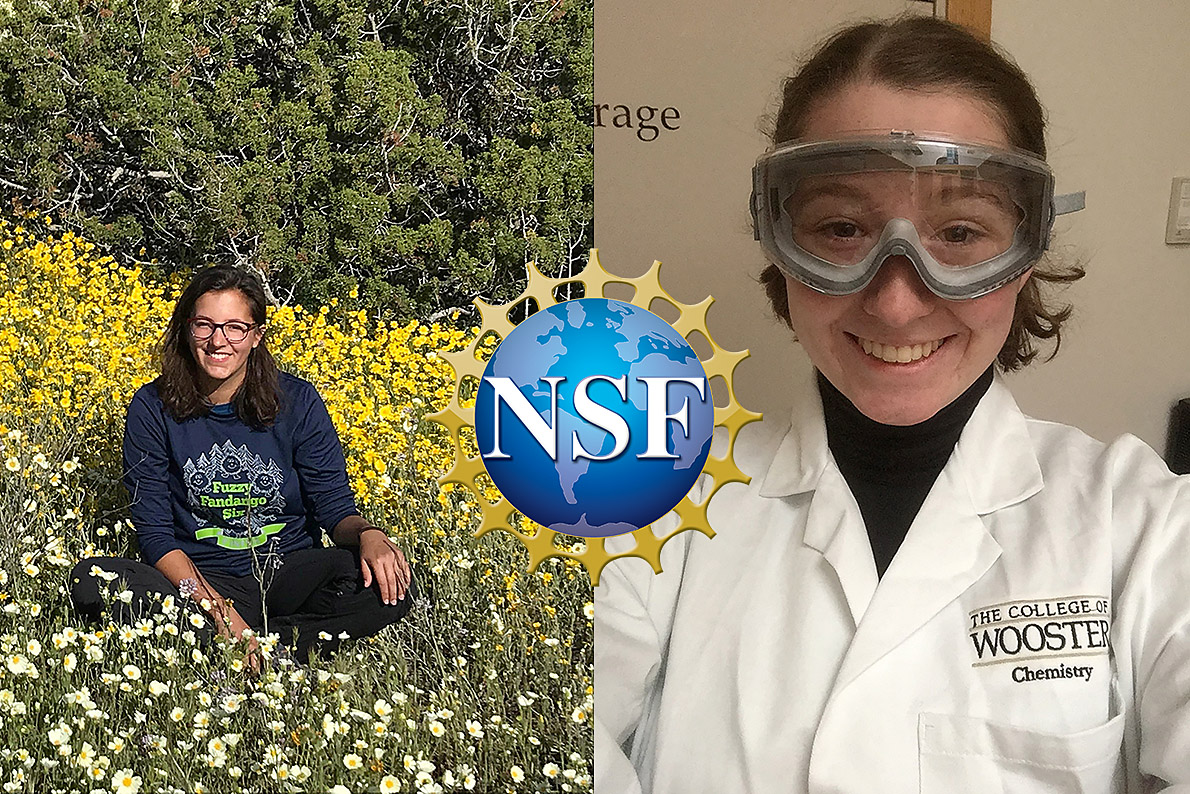
NSF Picks Wooster Alumna, Current Wooster Student for Graduate Research Fellows

WOOSTER, Ohio – The National Science Foundation (NSF) has selected two young women scientists with a College of Wooster education—alumna Laura Leventhal ’18 and current senior Kyndalanne Pike—as fellows of its highly-competitive and prestigious Graduate Research Fellowship Program (GRFP).
Each fellow receives a three-year annual stipend of $34,000, plus a $12,000 cost of education allowance for tuition and fees, to conduct research at an accredited U.S. institution of graduate education of their choosing, as well as opportunities for international research and professional development. In return, the fellows are expected to become knowledge experts who can contribute significantly to research, teaching, and innovations in science and engineering.
Leventhal, who majored in biology, is an evolutionary ecologist with a passion for plant-pollinator interactions and will utilize her NSF fellowship at Stanford University. Her winning research proposal centered on the study of several species of California jewelflowers, which have a unique morphological structure—a bright purple cluster of male sterile buds or tufts—and a plan to decipher the unknown function of this structure through various field and greenhouse experiments.
“Wooster gave me the independent thinking, research, and writing skills necessary to be competitive for this fellowship,” stated Leventhal. “The NSF GRFP sponsors people, not projects. They are looking for someone who can fully think through an experiment, hypothesis, methods, and analysis as well as be able to relate it to the broader literature and write about it effectively, which are all skills I gained and fine-tuned through my Independent Study with Dr. Jennifer Ison.”
Since graduating from Wooster, Leventhal has taken on a variety of experiences, serving as a conservation and land management intern at the Bureau of Land Management in Boise, Idaho, an ethnobotanist in Mesa Verde National Park in Colorado, and lab manager of an evolutionary ecology lab at the University of California, Davis, where she is studying wildflowers’ responses to climate change.
Pike, a chemistry and mathematics double major who will graduate from Wooster in May, will employ her fellowship at the University of Wisconsin-Madison starting next academic year. There, she will pursue a Ph.D. in chemistry on the analytical track.
This past year, Pike was a Goldwater Scholar, conducting research in which she developed new techniques for trace analysis of environmental contaminants. Her Independent Study, which focused on tracing perfluoroalkyl substances—an emerging contaminant of concern—in rainwater and performing statistical modeling, served as the bulk of her successful NSF GRFP proposal.
Pike noted that the purpose of the proposals are to evaluate applicants’ ability to come up with a research project, thus the actual project will not necessarily take place. For example, Leventhal will be doing research in a lab that focuses on modeling genomic, field, and climate data to understand the adaptations of plants to climate change.
Pike, who served as the lead student assistant for the Liquid Chromatography-Mass Spectrometry instrument at Wooster and also gained valuable experience via an internship in analytical chemistry at Corteva last summer, added that “this (GRFP) process would not have been the same” without the support from faculty mentors Paul Edmiston and Jennifer Faust. “My research is built upon theirs. They started my interest in environmental chemistry,” she remarked.
The NSF GRFP is the country’s oldest fellowship program that directly supports graduate students in various science, technology, engineering, and mathematics (STEM) fields, according to its website. The program recognizes and supports outstanding students who are pursuing research-based master’s and doctoral degrees at accredited U.S. institutions.
Posted in News on April 13, 2020.
Related Posts
Related Areas of Study
Chemistry
Access to labs, research opportunities, and small classes give chemistry majors lots of options after graduation.
Major MinorBiology
Explore molecular and cellular biology, ecology and more with top faculty and access to extensive lab facilities.
Major Minor

